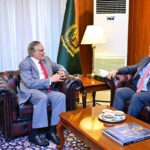NEW YORK, Feb 14 (APP): The Committee to Protect Journalists (CPJ), a U.S.-based independent watchdog body, on Tuesday called on Indian authorities to stop harassing journalists after tax officials raided BBC offices in New Delhi and Mumbai in what was seen as retaliation against the British broadcaster’s recent documentary critical of Prime Minister Narendra Modi.
“Raiding the BBC’s India offices in the wake of a documentary criticizing Prime Minister Narendra Modi smacks of intimidation,” Beh Lih Yi, CPJ’s Asia programme coordinator, said in a statement.
“Indian authorities have used tax investigations as a pretext to target critical news outlets before, and must cease harassing BBC employees immediately, in line with the values of freedom that should be espoused in the world’s largest democracy,” she added.
Officials from the Income Tax Department sealed the offices as part of an investigation into alleged international taxation irregularities, according to the BBC. Tax officials told Indian news media that they were checking account books and that the raids “are not searches.” Multiple reports citing unnamed employees said authorities seized employees’ laptops and mobile phones, CJP said.
The BBC is “fully cooperating” and hopes to “have this situation resolved as soon as possible,” BBC said on Twitter.
The Indian government ordered YouTube and Twitter to take down links sharing the first episode of the two-part BBC documentary investigating Modi’s alleged role in 2002 riots in Gujarat.
Indian tax authorities raided news outlets Newslaundry and Newsclick in 2021 following critical coverage of government policies and Modi’s supporters on the Hindu right wing.
According to the documentary, Modi ordered police to turn a blind eye to sectarian riots in Gujarat state, where he was the chief minister at the time.
The violence left at least 1,000 people dead, most of them Muslims. India’s government blocked videos and tweets sharing links to the documentary using emergency powers under its information technology laws.
Indian government adviser Kanchan Gupta had slammed the documentary as “hostile propaganda and anti-India garbage”.
University student groups later organized viewings of the documentary despite campus bans, defying government efforts to stop its spread. Police arrested two dozen students at the Delhi University after stopping a screening there.
The 2002 riots in Gujarat began after 59 Hindu pilgrims were killed in a fire on a train. Thirty-one Muslims were convicted of criminal conspiracy and murder over that incident.
The BBC documentary cited a previously classified British foreign ministry report quoting unnamed sources saying that Modi met senior police officers and “ordered them not to intervene” in the anti-Muslim violence by right-wing Hindu groups that followed.
CPJ said it emailed the Income Tax Department for comment but did not receive any response.






